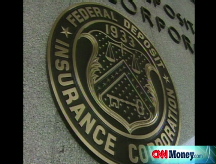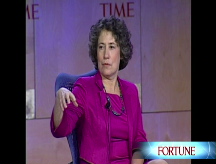FDIC is set to sell IndyMac
The agency plans to unload IndyMac to group of private equity and hedge fund firms. Questions remain as to whether its aggressive loan modification plan will continue.
NEW YORK (CNNMoney.com) -- A group of investors is on the verge of buying the one of the nation's largest failed banks.
IndyMac Bank, which was taken over by the Federal Deposit Insurance Corp. after it collapsed in July under the weight of risky mortgages, is set to be bought by a group of private equity and hedge fund firms, according to a source familiar with the situation. The consortium includes investment firms J.C. Flowers & Co. and Dune Capital Management, as well as hedge fund Paulson & Co.
Neither the FDIC nor any of the potential buyers could be reached for comment. The agency has said it expects a deal to be announced by year-end.
The California thrift's collapse is the most expensive bank failure in U.S. history. The FDIC expects to spend $8.9 billion protecting the customer deposits at IndyMac, which had $19 billion in deposits and $32 billion in assets when it failed. The final cost will depend on how much the agency receives in the sale.
Co-founded by Angelo Mozilo of Countrywide fame, the bank has 33 branches. It specialized in Alt-A mortgages, which do not require a borrower to provide proof of their income. Alt-A borrowers, like their subprime brethren, are defaulting on their mortgages in droves.
Of the 25 banks that have failed so far this year, IndyMac is the only one the FDIC could not immediately sell. Last month, the agency expanded the pool of bidders for failed banks by allowing those without bank charters to bid for the institutions. Bidders would need to obtain charters before the deal closes.
The likely consortium of bidders have applied for a federal holding company charter under the name HoldCo LLC, according to the source. This charter is for institutions in several lines of business in the financial industry.
The FDIC would have to bless the purchase before the Office of Thrift Supervision would provide the charter. The deal may not close until late January or February, the source said.
Though its troubles have since been dwarfed by the trillions the federal government is spending to prop up the nation's financial sector, IndyMac has served as a high-profile experiment in loan modification.
FDIC Chairman Sheila Bair, who has long advocated for more aggressive foreclosure prevention efforts, has used the bank to put her streamlined loan modification plan into effect. IndyMac officials have sent letters to at least 23,000 delinquent borrowers and have verified incomes and had completed modifications for over 7,500 loans, as of mid-December. Thousands more workouts are in the pipeline.
Bair has sought to replicate her program nationwide, though Bush administration officials have balked at the $24 billion pricetag. However, other banks are adopting the program, most notably Citigroup (C, Fortune 500), which was forced to implement it as a condition of its November government bailout.
What will happen to IndyMac's modification program under the new owners remains to be seen.
Based in New York, J.C. Flowers is a global private equity group that focuses solely on the financial services sector. Established in 1998 by J. Christopher Flowers, it has invested more than $11 billion of capital in the sector. Its name was linked with last-minute offers for Lehman Brothers and American International Group (AIG, Fortune 500) in mid-September, before the former filed for bankruptcy and the latter received an $85 billion government bailout. The firm backed out of a $25 billion bid for Sallie Mae last year, prompting a high-profile legal battle with the student lender, which ultimately dropped its lawsuit.
Christopher Flowers, who runs J.C. Flowers, bought a tiny bank in northern Missouri with $14 million in assets in August. At the time, he hinted at plans to expand.
Dune Capital, also headquartered in New York, was founded in 2004 by two former Goldman Sachs executives, David Neidich and Steven Mnuchin. It specializes in real estate finance, though it has also invested in casinos. Mnuchin had worked for financier George Soros and serves on the board of Sears Holdings, the retailer run by hedge fund manager Edward Lampert.
Paulson & Co. was founded in 1994 by John Paulson, who was a managing director in mergers and acquisitions at Bear Stearns. Paulson, who manages $36 billion in assets, is well-known for betting against the mortgage industry. ![]()






